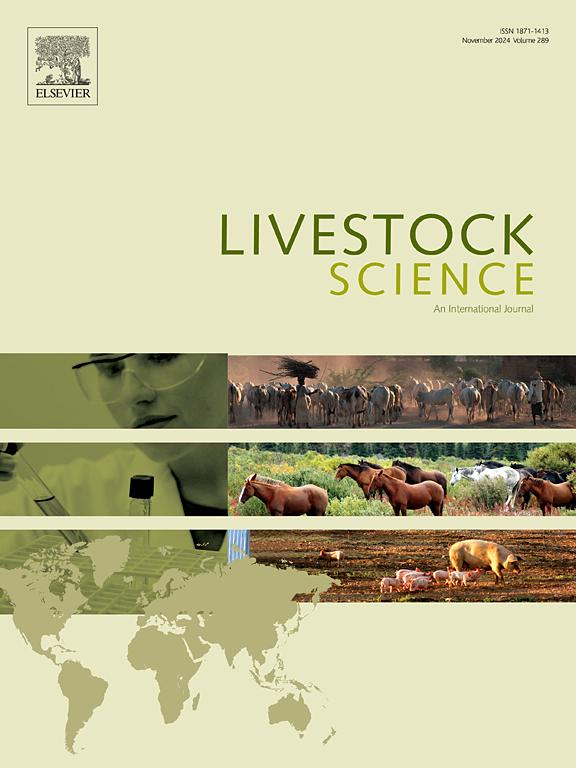放牧剥夺与放牧限制对妊娠母羊毛发和唾液皮质醇水平的影响
IF 1.8
3区 农林科学
Q2 AGRICULTURE, DAIRY & ANIMAL SCIENCE
引用次数: 0
摘要
放牧是反刍动物的一种自然行为,当无法进入牧场时,就会出现行为挫折,从而导致慢性压力。在绵羊中,长期饲养的母羊没有研究过皮质醇等应激生物标志物的反应。在本研究中,两组20只怀孕的Ripollesa母羊进行了为期10周的实验。5h放牧组(5h-G)每天有5小时的放牧时间,而圈养组(H)没有放牧时间,永久留在牲口棚中。在剥夺放牧第5、10周(W5、W10)采集毛发样本,在第0、3、5、8、10周(W0、W3、W5、W8、W10)采集唾液样本。在整个研究期间,5h-G组和H组的毛发皮质醇(HC)和唾液皮质醇(SC)均无显著差异(P >;0.05)。然而,母羊携带1只或2只羔羊的差异有统计学意义(PROL1 HC=4.97±0.1,PROL2 HC=7.20±0.1,P <;0.05)。没有证据表明,通过头发和唾液中的皮质醇水平可以检测到慢性压力,尽管在先前发表的来自同一经验的结果中出现了异常行为。唾液皮质醇随着时间的推移表现出显著的可变性,它应该与其他生物标志物联合使用。需要进一步的研究来分析怀孕的影响、较长时间的放牧剥夺以及使用羊毛样本或其他身体部位。本文章由计算机程序翻译,如有差异,请以英文原文为准。
Effect of grazing deprivation as compared to grazing restriction on hair and saliva cortisol levels in pregnant ewes
Grazing is a natural behaviour of ruminants and when access to pasture is deprivated, a behavioural frustration appears, which can lead to chronic stress. In sheep, no response of stress biomarkers like cortisol has been studied in permanent housed ewes. In the present study, two groups of twenty pregnant Ripollesa ewes were used in a 10-week experiment. The 5h-grazing group (5h-G), had access to pasture five hours daily, and the housed group (H) had no access to pasture and remained permanently in the barn. Hair samples were collected on Weeks 5 and 10 of grazing deprivation (W5, W10), and saliva samples on Weeks 0, 3, 5, 8 and 10 (W0, W3, W5, W8, W10). No significant differences in hair cortisol (HC) or saliva cortisol (SC) were observed between Groups 5h-G and H throughout the study period (P > 0.05). However, significant differences were observed in ewes carrying one or two lambs (PROL1 HC=4.97±0.1, PROL2 HC=7.20±0.1, P < 0.05). No evidence of chronic stress could be detected through cortisol levels in hair and saliva although abnormal behaviours appeared in previous results published from the same experience. Saliva cortisol showed a significant variability over time and it should be used in a combination with other biomarkers. Further research is needed to analyse pregnancy effect, longer periods of grazing deprivation, and the use of wool samples or other body regions.
求助全文
通过发布文献求助,成功后即可免费获取论文全文。
去求助
来源期刊

Livestock Science
农林科学-奶制品与动物科学
CiteScore
4.30
自引率
5.60%
发文量
237
审稿时长
3 months
期刊介绍:
Livestock Science promotes the sound development of the livestock sector by publishing original, peer-reviewed research and review articles covering all aspects of this broad field. The journal welcomes submissions on the avant-garde areas of animal genetics, breeding, growth, reproduction, nutrition, physiology, and behaviour in addition to genetic resources, welfare, ethics, health, management and production systems. The high-quality content of this journal reflects the truly international nature of this broad area of research.
 求助内容:
求助内容: 应助结果提醒方式:
应助结果提醒方式:


